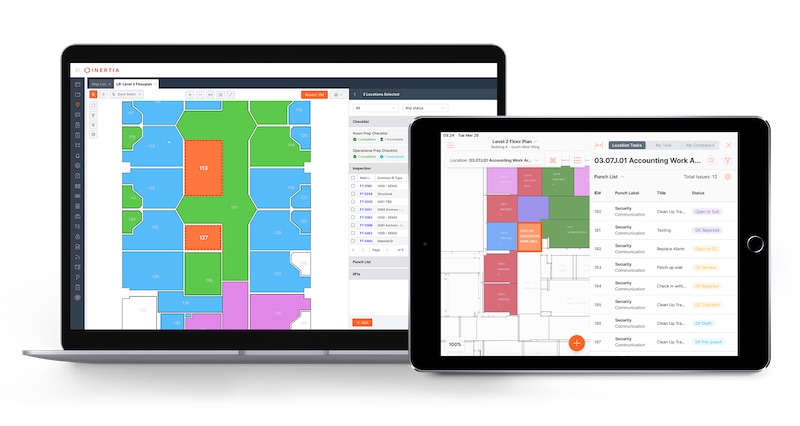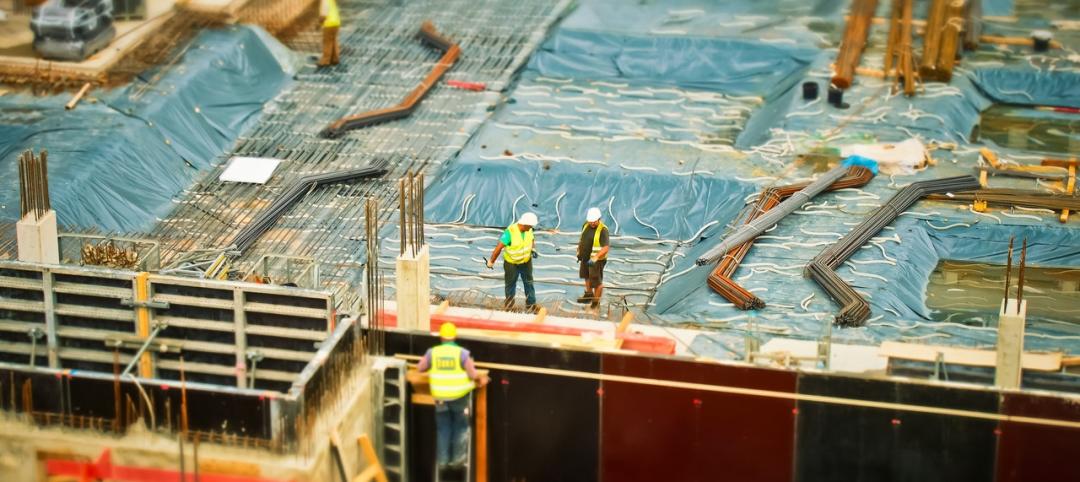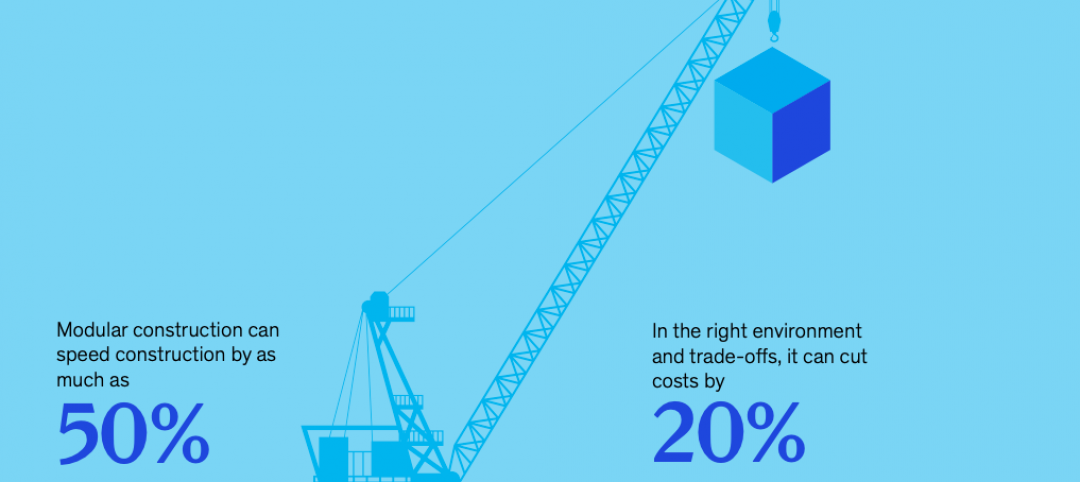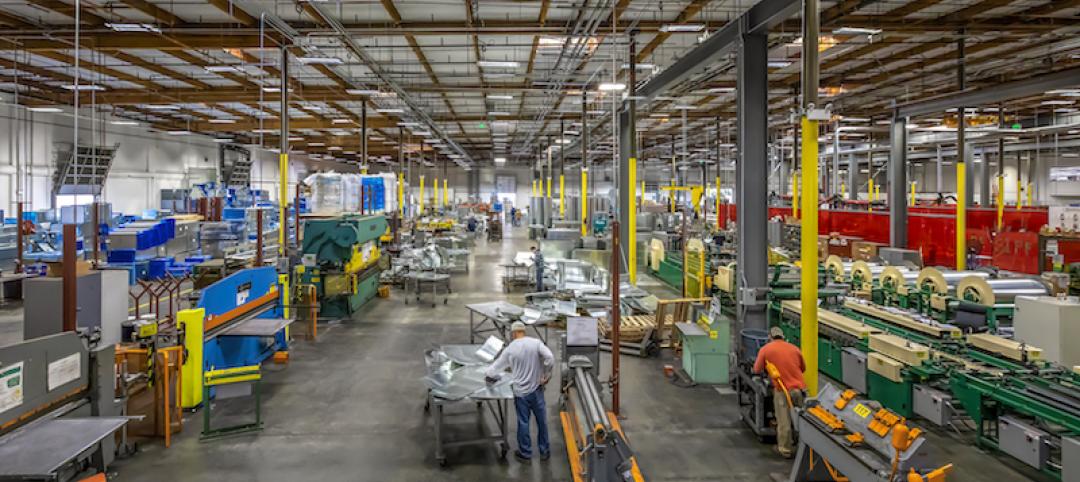San Diego-based Inertia Systems today officially announces the launch of Inertia Platform, a cloud-based SaaS enterprise construction management platform that automatically connects and coordinates teams, processes, project and quality management through BIM and smart drawings.
The 10-year-old company, whose marketing tagline is “Closing the loop from design to built,” is introducing its platform at a time when the construction sector is still determining how best to use jobsite technology to improve productivity. A recent FMI Corp.-PlanGrid report estimated that construction overages and rework result in $177.5 billion in wasted labor costs annually in the U.S. alone.
Most project management software is list-based cloud collaboration, explains Matthew Hudelson, Inertia Systems’ CEO. What differentiates his company’s product is its “pivot to a location-based platform that leverages information from the BIM model.”
Generated automatically based on designs, each record created in the platform is automatically attached to its physical location on the project map and updated wherever designs change. Inertia Platform uses patent-pending technology to connect information from every solution and Building Team member (including contractors, owners, engineers and architects) throughout every phase in real time, ensuring all information stays connected and up to date throughout the construction process.
PLATFORM PROVIDES COMPLIANCE VERIFICATION

Among Inertia Platform's functions is the ability to create real-time mobile punchlists.
What’s unique about this software, Hudelson goes on, is that it provides collaborative information for Project Management, Quality Management, Performance Management, and Compliance Management. That last function is critical in California’s healthcare sector, which is highly regulated and where construction managers must prove to inspectors that their work complies with the state’s codes. “Inertia makes this information accessible quickly,” he says.
To develop its Inertia Platform, Inertia Systems has worked with leading construction management firms that include Turner Construction, McCarthy Building Companies, Clark Construction, Kiewit Construction, and AECOM. “We’ve worked alongside builders, owners, inspectors, architects, and team members to learn how our tools and workflows impact challenges they face and, in turn, learned to address their varying needs and inefficiencies in scalable ways throughout every single step of the construction process,” says Hudelson.
Inertia Systems has been used by dozens of owners and GCs in the healthcare, education, and sports and entertainment sectors. The projects it contributed to include the Lucile Packard Children’s Hospital Stanford, Scripps Prebys Cardiovascular Institute, Sutter Health California Pacific Medical Center Van Ness Campus Hospital, and a major NFL stadium.
Related Stories
Multifamily Housing | Jul 23, 2019
Is prefab in your future?
The most important benefit of offsite construction, when done right, is reliability.
Building Tech | Jun 26, 2019
Modular construction can deliver projects 50% faster
Modular construction can deliver projects 20% to 50% faster than traditional methods and drastically reshape how buildings are delivered, according to a new report from McKinsey & Co.
Building Technology | May 30, 2019
An ESD-incubated intelligent building platform is making two buildings in Chicago smarter
The new company, Cohesion, helps synchronize tenants’ workflows.
M/E/P Systems | May 23, 2019
Process analysis is how one MEP producer is coping with the industry’s labor woes
Southland Industries takes a measured approach to leaning into technology.
Building Technology | Mar 26, 2019
Chain of command: Blockchain for AEC
Blockchain isn’t just about exchanging Bitcoin. It could emerge as the next construction management and lifecycle assessment tool.
Building Technology | Mar 25, 2019
Blockchain: A primer
The simplest explanation of this technology is that blockchain is a digital distributed ledger of transactions or records that exists across multiple participants and computers in a peer-to-peer network.
Industrial Facilities | Mar 10, 2019
The burgeoning Port San Antonio lays out growth plans
Expansions would accommodate cybersecurity, aerospace, and defense tenants, and help commercialize technologies.
Building Technology | Mar 8, 2019
What is your firm's innovation 'hit rate'?
As firms begin to adopt the practices and mindset of Silicon Valley tech and advanced manufacturing, it’s fair to ask: Are all of these innovation projects and initiatives working?
Building Technology | Mar 6, 2019
Australia’s prefab construction sector is trying to break out from its 'getting there' stage
A paper by Deloitte looks back at an origin case study. But the country has yet to develop a fully formed industry.
Building Technology | Feb 21, 2019
Smart buildings take hold: 8 ways smart tech is transforming commercial buildings
The next generation of intelligent buildings offers promise for unseen levels of energy efficiency, optimization, and occupant health and productivity.

















